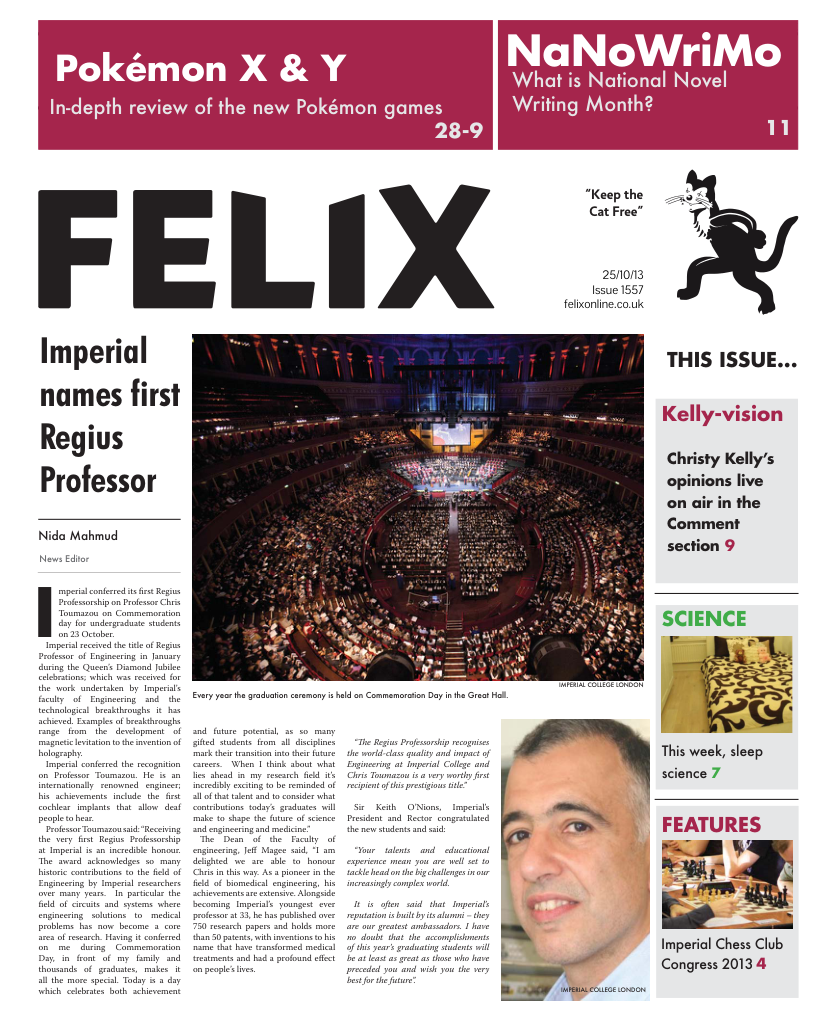Postgraduate Study: Is it for you?
The Careers Service is back with tips on how to bag yourself a Postgrad position.

Every year, approximately 30% of Imperial College undergraduates go on to further study, so we know it’s a popular option. But what do you need to know and how do you make the best choice of course and institution?
Let’s look at the basics. The first question you need to ask yourself is what is your long term goal, and how will further study help you achieve this. In all cases further study will take time and in many cases it will also take money so you need to be clear up front on what you expect to gain. It could be that the career area you hope to go into has a requirement of some kind of further qualification such a PGCE for teaching or it might be that you hope to become more specialised which may open up certain areas of work. Either way it is important to weigh up to pros and cons and check that your expectations are realistic. Most courses publish information on outcomes for their graduates so look carefully to see if people are going on to the types of work you hope to follow. What type of course is best - Masters or PhD or perhaps a better question initially is taught course or research course?
MSc and MA courses are normally one calendar year in length and take the form of a taught period from October to May, so very like you undergraduate experience, as well as a short research project across the summer months usually submitted in September. These yearlong courses can provide an opportunity to deepen and focus your subject knowledge in an area of interest from your current degree or to change direction by studying a new subject of interest, possibly vocational or career-related. Entry onto a Masters is sometimes possible with a 2:2 class of degree depending on where you apply but a 2:1 is commonly required so you will need to research the entry requirements for each course.
Research courses include MRes (usually one year) or PhD (three to four years). These courses are research based and so as part of your application process you may be asked to include a research proposal outlining you area of interest and relating this to the research specialisms in the department you are applying to. There are some aspects you need to consider carefully before embarking on a research degree. Unlike your undergraduate course your progress through a research degree is much more self-driven. Before choosing for this option you need to think through your level of motivation, your persistence and resilience. To be successful you really need to enjoy your subject area, you will be immersed in this for the next three to four years. You should also have the strength to push yourself and the determination to overcome setbacks. You will have a supervisor to support you but without strong motivation you will find the process of a PhD difficult. In most cases you should expect to gain a 1st or a 2:1 in your first degree and in some instances it will be expected that you complete a separate MSc or MRes before applying to a PhD. It is not unusual now to find a ‘one plus three’ structure where you apply for both Masters and PhD and on successful completion of the one year Masters you continue on to a PhD.
The application process can be confusing. It takes time to properly research postgraduate study and unlike your undergraduate application there is normally no limit on the number of Masters or PhD courses you can apply for. You will need to complete separate applications forms for each institution. There are a few exceptions to this and these tend to be in very vocational areas such as PGCE for teaching and Graduate Diploma courses in Law where you apply through a clearing system similar to UCAS. Choosing research degrees requires even more thought and it will really help to discuss your research ideas with your department. Your academic contacts will have ideas about how to develop your research proposal and information about which research groups and university departments specialise in your subject. They may also be able to provide some introductions for you to do some early networking or engage in some mini research experiences. If your final year undergraduate project is connected to the area you think you might like to study at PhD then use the opportunity to set up some links at Imperial and further afield through your project.
If you are considering applying for courses outside the UK you also need to find out about additional tests, exams and application deadlines. For instance applicants for postgraduate study in the USA have to complete an appropriate admissions test depending on the subject of study such as the GMAT, GRE General, GRE Subject and MCAT. It is also important to understand not just the application process but also the structure of courses, for instance in the USA it is not unusual to take 8 to 9 years to gain a PhD. Details on how to apply for study in the USA can be found via the Fulbright website at fulbright.org.uk
Finding the funding can also take time. Whether you are a UK, EU or international student finding funding for postgraduate study is a complex process. When researching possible courses you should also be asking questions about availability of funding. Are there research council grants available, industry funded scholarships, university scholarships? How many participants have to self-fund? In the instance of research council funding you need to check out the prerequisites and the time scales, often RCUK funded places require earlier application deadlines. If you are considering self-funding you may also need to check if studying part time is an option allowing you time to also work to pay the bills. It is important to shop around when thinking about self-funded further study. Universities charge differing fees particularly at Masters level so investigate widely to get the best deal. Europe might be an option as increasingly European universities are teaching in English and often have surprisingly low tuition fees.
Further information on applying for further study and funding can be found at www3.imperial.ac.uk/careers/ug/consideringfurtherstudy
Finally, start your planning early. Talk to PhDs and Post Docs in your department. Build up a realistic picture of what is going to be involved, the excitement as well as the challenges and remember that you can arrange to meet with one of the Careers Consultant team to discuss your further study ideas and for support with the application process.






